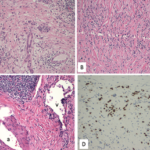IgG4-related disease (IgG4-RD) is an immune-mediated fibro-inflammatory condition that can affect multiple organs and lead to tumefactive, tissue-destructive lesions and organ failure. In the past decade, the disease has become recognized as a unified systemic disorder that links many individual organ conditions once considered unrelated. Involvement of nearly every anatomic site has been reported, but the most commonly affected organs or tissue sites are the pancreas, biliary tract, major salivary glands (submandibular, parotid), lacrimal glands, retroperitoneum, and lymph nodes. The epidemiology of the disease remains poorly understood. It is often mistaken for cancer, an infection or another immune-mediated condition (e.g., Sjögren’s syndrome, granulomatosis with polyangiitis, giant cell arteritis). Multiple approaches to the IgG4-RD management have been reported, but no randomized clinical trials have been conducted and there are no formal treatment guidelines. In preparation for the Second International Symposium on IgG4-RD and Associated Conditions, an international panel of 42 experts assembled to develop recommendations for the management of IgG4-RD.
An article in the July issue of Arthritis & Rheumatology describes the process by which the guidance statement on the management and treatment of IgG4-related disease was developed and presents the seven recommendations that were developed. In short they are:
- The most accurate assessments in IgG4-RD are based on a full clinical history, physical examination, selected laboratory investigations, and appropriate radiologic studies.
- Diagnostic confirmation by biopsy is strongly recommended for the exclusion of malignancies and other IgG4-RD mimicking conditions.
- All patients with symptomatic, active IgG4-RD require treatment, some urgently. A subset of patients with asymptomatic IgG4-RD require treatment.
- Glucocorticoids are the first-line agent for remission induction in all patients with active, untreated IgG4-RD unless contraindications to such treatment are present.
- Some but not all patients require the combination of glucocorticoids and a steroid-sparing immunosuppressive agent from the start of treatment. This is because glucocorticoid monotherapy ultimately will fail to control the disease and long-term glucocorticoid toxicities pose a high risk to patients.
- Following a successful course of induction therapy, certain patients benefit from maintenance therapy.
- Retreatment with glucocorticoids is indicated in patients who relapse off of treatment following successful remission induction. Following relapse, the introduction of a steroid-sparing agent for continuation in the remission maintenance period should be considered.
Khosroshahi A, Wallace ZS, Crowe JL, et al. International consensus guidance statement on the management and treatment of IgG4-related disease. Arthritis Rheumatol. 2015 Jul;67(7):1688–1699.


